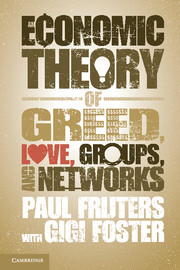Book contents
5 - The aggregate view
Published online by Cambridge University Press: 05 May 2013
Summary
In this chapter, the separate views on love, groups, power, and networks presented in the previous chapters are brought together to paint a simplified picture of our socioeconomic system, using the existing mainstream economics view as a foundation. I have already begun to tackle this integrative endeavor at points in some previous chapters – for example, when the notion of group power was integrated into existing economic views of our political system, and when the interpretation of the role of trade networks was integrated into standard growth theory. This chapter takes the task of integration as its primary objective and builds on all of the prior work presented in the book.
The first part of this chapter begins by drawing out the interplay between the central notion of greed in mainstream economics, and the reality of group power that arises within the different group archetypes. Then, the entire socioeconomic system is re-interpreted as arising from an interplay between greed and love, treating trade networks and groups as the instruments and catalysts of these two forces.
The second part of the chapter sets up a new policy heuristic that extends the stylized policy heuristic offered by mainstream economics.
Markets, groups, and power
The symbiosis of the private sector, the public sector, and the nation state
The fact that a perfect market economy will create a positive outcome for the group, because of individual greed, explains why most modern economies feature a large private sector where organizations are allowed to operate for profit.
- Type
- Chapter
- Information
- An Economic Theory of Greed, Love, Groups, and Networks , pp. 301 - 348Publisher: Cambridge University PressPrint publication year: 2013



